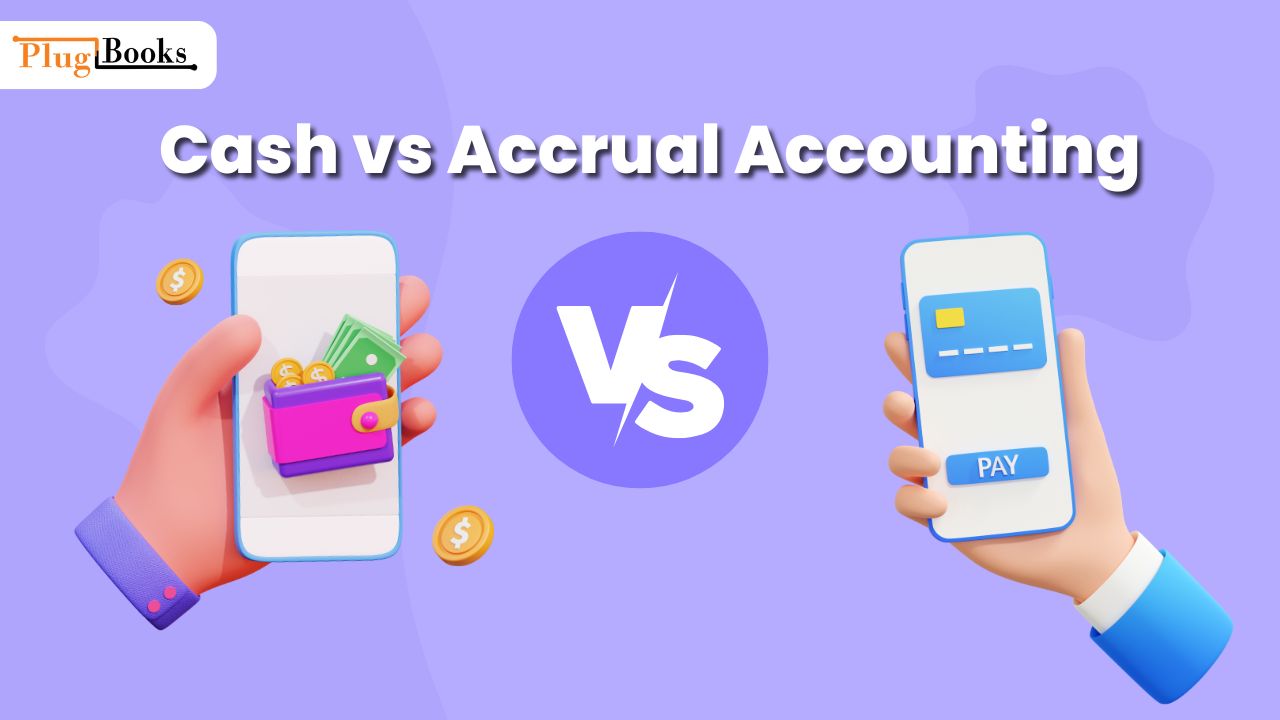Managing your business finances effectively starts with choosing the right accounting method. But when it comes to cash vs accrual accounting, which one should you pick? Understanding these two methods can make or break your financial clarity and decision-making.
Knowing how these accounting methods work is essential to your success, whether you’re a small business owner or running a growing enterprise.
Keypoints:
- Cash vs accrual accounting differs primarily in the timing of when income and expenses are recorded.
- Cash accounting records transactions only when cash is received or paid, making it simple and suitable for small businesses.
- Accrual accounting records income when it is earned and expenses when incurred, providing a more accurate financial picture.
- If you prioritize simplicity and real-time cash flow tracking, cash accounting might be the better option.
- Businesses that need comprehensive financial reporting or deal with inventory often benefit from accrual accounting.
- Choosing between cash vs accrual accounting depends on your business size, complexity, and future goals.
What Is Cash Accounting?
Cash accounting is the simplest of the two methods. It records income when cash is received and expenses when they’re paid. Think of it as your bank account’s real-time reflection—it’s straightforward to track.
Key Features of Cash Accounting:
- Revenue is recorded only when payment is received.
- Expenses are recorded when payments are made.
- Ideal for small businesses or freelancers with straightforward transactions.
Benefits of Cash Accounting:
- Simplicity: No need for advanced accounting knowledge.
- Improved Cash Flow Insight: This shows exactly how much cash you have on hand.
- Tax Advantages: Taxes are paid on actual income received, not on invoices sent.
What Is Accrual Accounting?
Accrual accounting is more comprehensive. It records income when it’s earned (even if payment isn’t received) and expenses when they’re incurred. This method provides a broader picture of financial health.
Key Features of Accrual Accounting:
- Revenue is recognized when earned, not when cash is received.
- Expenses are recorded when incurred, even if unpaid.
- Often required for larger businesses or those dealing with inventory.
Benefits of Accrual Accounting:
- Accurate Financial Picture: Captures all revenues and expenses regardless of cash flow.
- Complies with GAAP: Generally accepted accounting principles often require this method.
- Better Business Planning: Offers a clear view of profitability trends.
Simplify your e-commerce accounting with PlugBooks. Automate tracking, manage taxes, and get real-time insights—all in one place. Focus on growth, and let PlugBooks handle the rest!
Cash vs Accrual Accounting: Key Differences
Understanding the differences between cash vs accrual accounting can help you decide which method aligns with your business goals.
| Aspect | Cash Accounting | Accrual Accounting |
| Recognition of Income | When cash is received | When revenue is earned |
| Recognition of Expenses | When cash is paid | When expenses are incurred |
| Complexity | Simple and straightforward | More complex |
| Best For | Small businesses, freelancers | Medium to large businesses |

How to Choose Between Cash and Accrual Accounting
Selecting the right method depends on your business type, size, and financial goals.
Go for Cash Accounting If:
- Your business has simple cash-based transactions.
- You’re a freelancer or solopreneur.
- You prioritize simplicity and ease of tracking cash flow.
Opt for Accrual Accounting If:
- Your business deals with inventory.
- You aim for long-term financial planning.
- You want to comply with industry regulations or attract investors.
Cloud Accounting Software: A Must-Have for E-commerce Sellers
The first step toward streamlined finances for any e-commerce seller is investing in cloud-based accounting software. No matter the size of your business, this tool should be a priority before exploring other automation technologies.
Why Choose Cloud Accounting Software?
Cloud accounting software offers e-commerce sellers:
- A clear visual overview of their financials.
- Instant access to reports and insights.
- Anytime, anywhere access to their books.
- Seamless data integration from e-commerce platforms.
- Advanced encryption for secure data protection.
- Controlled access levels for sharing with your team or accountant.
Best of all, there’s nothing to install or download—everything is securely stored and easily accessible online.
For e-commerce accounting, we recommend trusted platforms like QuickBooks Online, and Xero to keep your finances in check and your business running smoothly.

PlugBooks simplifies e-commerce accounting by automating tasks and seamlessly connecting to platforms like Xero and QuickBooks Online. Focus on growth while we handle the numbers!
Learn more about accounting Software: 10 Best eCommerce Bookkeeping Software
Hybrid Approach: Best of Both Worlds?
Some businesses use a hybrid approach that blends cash and accrual methods. For instance, you might use cash accounting for daily transactions but accrual accounting for financial reporting. This method isn’t officially recognized but can provide flexibility for specific needs.
Conclusion
Choosing between cash vs accrual accounting isn’t a one-size-fits-all decision. It depends on the size, complexity, and goals of your business. While cash accounting offers simplicity and real-time insights, accrual accounting provides a more accurate financial picture. Take the time to assess your needs and consult a professional accountant if necessary.
For more accounting tips, tools, and insights, visit PlugBooks.io and make your financial management stress-free!




